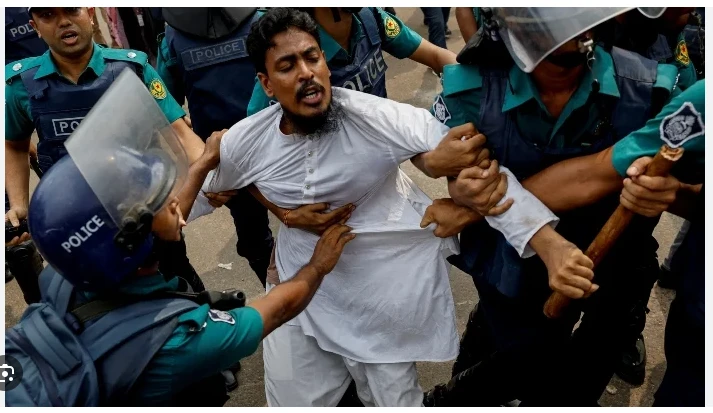'Strong indications' Bangladesh security forces used 'unnecessary' force: UN

Stay tuned with 24 News HD Android App

The United Nations said Friday there were strong indications that the Bangladeshi security forces used unnecessary force in tackling the student-led uprising that ousted premier Sheikh Hasina.
Hasina, 76, fled to neighbouring India by helicopter last week as demonstrators flooded Dhaka's streets in a dramatic end to her iron-fisted rule of 15 years.
More than 450 people were killed in the weeks of protests leading up to her ousting on August 5.
"There are strong indications, warranting further independent investigation, that the security forces used unnecessary and disproportionate force in their response to the situation," the UN human rights office said in a preliminary report.
"Alleged violations included extrajudicial killings, arbitrary arrests and detention, enforced disappearances, torture and ill-treatment, and severe restrictions on exercise of freedoms of expression and peaceful assembly."
The report stressed the need for a rapid restoration of law and order, and the need to prevent further loss of life, violence and acts of reprisals.
The interim government replacing Hasina, led by Nobel laureate Muhammad Yunus, has invited UN investigators to probe the violent "atrocities" that accompanied her ousting.
Yunus, 84, returned from Europe last week to head a temporary administration that faces the monumental challenge of steering democratic reforms.
UN human rights chief Volker Turk said the transition in Bangladesh was a chance to ensure governance is anchored in rights and the rule of law.
"The transition ahead presents an historic opportunity to reform and revitalise the country's institutions, to restore fundamental freedoms and civic space, and to give all in Bangladesh a part in building the future," he said.
"Accountability for violations and justice for the victims are key for the way forward, and will need to be accompanied by a national healing process," he said.
Second retired general to join cabinet
A second retired military general was set to join Bangladesh's interim government on Friday, one of four new additions to the caretaker administration formed after last week's ouster of autocratic ex-premier Sheikh Hasina.
Jahangir Alam Chowdhury, 71, and three others will join the "council of advisers", the de facto cabinet now running Bangladesh under the leadership of Nobel laureate Muhammad Yunus.
Chowdhury was a three-star general and second-in-command of the army but retired from the forces in 2010 -- the year after Hasina, now 76, took office.
The pair had butted heads in the aftermath of a savage mutiny by troops against senior military officers that raised fears of a power struggle between the armed forces and the government.
Chowdhury and three others were scheduled to be sworn into office later on Friday, said a statement from the council of advisers.
The 2009 mutiny killed 74 people over two days, including 57 senior officers, some of whom were hacked to death or burnt alive before their bodies were dumped in sewers or shallow graves.
More than 150 soldiers were sentenced to death in 2013 for participating in the uprising, which began partly in anger that their pleas for better pay and treatment had been ignored.
Their trials were criticised for procedural irregularities and claims that the defendants were tortured while in custody, which Hasina's government denied.
Chowdhury was tasked with leading a "neutral" army probe into the mutiny soon after it occurred, competing with a rival investigation already set up by Hasina's administration.
He left the army a year later on his 57th birthday, the usual retirement age for officers of his rank at that time.
Also to be sworn in Friday were former cabinet secretary Ali Imam Majumder, Cambridge-educated economist Wahiduddin Mahmud, and professor and infrastructure expert Fouzul Kabir Khan.
Sworn in last week were rights activists, an Islamic cleric, a former central bank chief, and two student leaders of the protests that toppled Hasina.
Retired one-star army general Sakhawat Hossain was also tapped to run the home ministry.
Several of the cabinet's members are associated with the Bangladesh Nationalist Party, the main opposition to Hasina's Awami League.
Hasina's 15-year rule saw widespread human rights abuses, including the mass detention and extrajudicial killings of her political opponents.
Yunus, 84, returned from Europe eight days ago to head a temporary administration that faces the monumental challenge of steering democratic reforms.
On Thursday, his government said it had invited a United Nations' fact-finding team to probe "atrocities" committed during the final weeks of Hasina's rule.
More than 450 people were killed in the weeks of protests leading up to her August 5 ouster, most by police fire.
